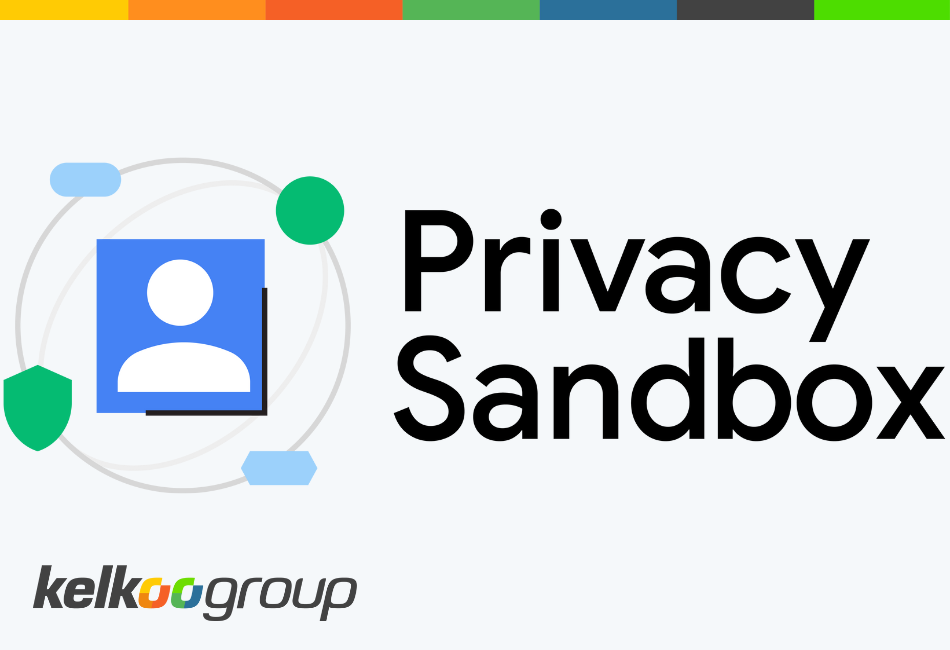
Understanding Google’s Privacy Sandbox
What is Google’s Privacy Sandbox?
Google’s Privacy Sandbox is a suite of tools designed to balance privacy on one side with the effectiveness and measurability of personalised ads on the other. Think of it as a set of privacy-focused standards and technologies that support the needs of advertisers and publishers while protecting user data.
Personalised ads often rely on individual tracking methods, such as the use of third party cookies, which have fallen out of favour in the industry in recent years, particularly in the context of EU GDPR legislation. The Privacy Sandbox proposes using anonymised and aggregated data to provide relevant ads to users, preserving privacy while also satisfying the needs of advertisers when it comes to reaching their target audiences.
Google’s Privacy Sandbox’s toolset is centred around users on Google Chrome. As one of the most popular web browsers these changes will impact a large tranche of the open web’s user base and almost all advertisers that want to continue to operate within it. If you’re an advertiser or work with advertising platforms then you could be affected.
How does Privacy Sandbox ensure privacy for users?
Google’s Privacy Sandbox maintains user privacy in an online advertising context by aggregating data and ensuring that individual user information remains protected. The concept behind the approach taken is called differential privacy. With this approach, attempts to extract meaningful data at an individual user level are prevented by introducing in various types of ‘noise’. In this context this could mean additional sales, incorrect order values or even delays introduced for certain data points. However, the further you zoom out, the more accurate the data becomes, this is because the statistical patterns within the data are preserved even if the data itself has been effectively anonymised through the process of introducing noise.
How will Kelkoo be affected?
Kelkoo connects merchants and publishers to offer the best deals to users. Central to our efforts is our Kelkoo Sales Tracking (KST) technology which our merchants place on their websites. Kelkoo’s performance and pricing algorithms rely on the data captured to maximise value for merchants and publishers alike. KST is primarily a first party tracking solution and as such is largely unaffected by the Privacy Sandbox changes expected on Chrome. However, in order to maximise our visibility of conversions in instances where first party data is not available, we will be working with the new Attribution Reporting API.
The Attribution Reporting API is just one of a large number of tools being made available to the broader marketing and advertising industry through the Privacy Sandbox initiative. This tool addresses the need for advertisers to understand how online advertising contributes to conversions. Kelkoo will be introducing a number of changes in order to respond to the introduction of Privacy Sandbox and begin working with the Attribution Reporting API.
How will merchants be affected?
For Kelkoo merchants with KST correctly installed, the impact of Privacy Sandbox is minimised. This is because KST relies primarily on first-party cookies to measure sales activity, whereas the changes on Chrome will more significantly impact those with reliance on third party cookies.
The anonymisation aspect of Privacy Sandbox implies some changes to KST to ensure that Kelkoo are able to report on merchant sales performance through the Attribution Reporting API. We will be updating KST to account for these changes. Note that this update does not require merchants to take any action.
We also expect announce a new server to server (S2S) implementation of KST to allow for an even more robust tracking solution. Merchants will be able to integrate this directly on their websites or through plugins on popular commerce solutions like Magento, WooCommerce and Prestashop. S2S tracking doesn’t rely on cookies at all and isn’t compromised by the varied approaches to privacy taken by different browsers or by adblocking technologies. It is the most reliable and accurate tracking solution available.
If you’re a merchant on our flagship Performance Flex solution, you may be wondering how our pricing algorithm could be affected. Even with the ‘noise’ that Chrome will introduce for the purposes of anonymisation, we’re confident that our pricing methods will continue to operate at levels of confidence well within the expected margins of error.
Finally, the introduction of Privacy Sandbox by Google is a great opportunity for you to ensure that your Consent Management Platform (CMP) is in place and working as expected. You can do this by performing a sales test using the KST installer from the Merchant Center. Our support team are always on hand to help you with this or any other issues you face.
How will publishers be affected?
It’s important to reiterate that the vast majority of sales tracking undertaken by Kelkoo is first party in nature. As such it does not fall under the remit of the Privacy Sandbox. The main impact on publishers relates to the earlier explanation of how Privacy Sandbox introduces noise for data from third party sources. Publishers relying on sales data at click level (when that tracking is reliant on third party cookies) will find this data no longer reliable. This will affect all networks and partnerships the publisher engages with that still rely on third party cookies. Some partnerships may employ statistical modelling techniques in order to infer this data. At Kelkoo, we are currently investigating the best approach to tackling this challenge in cases where first party data is not available.
While the reliance on Google’s Attribution Reporting API for conversion data on Chrome will mean some minor adjustments to how we calculate the value of the traffic you are delivering, we expect that your earnings and activity will be unaffected.
Timeline
Google Privacy Sandbox APIs are generally available now for parties to test. One percent of Google Chrome users are no longer supporting third-party cookies as of Q1 2024, with a view to roll this out more extensively in Q4. More information can be found on the Privacy Sandbox timeline.
